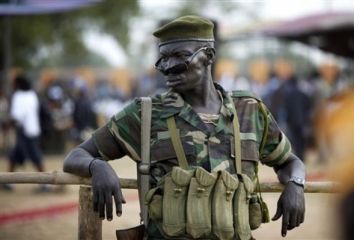South Sudan downplays risking becoming “lawless” state
September 7,2012 (JUBA) – South Sudan on Friday vehemently downplayed fears and concerns that it would slide into becoming “a lawless state” if the country’s leadership takes no immediate corrective measures to address the rapidly rising crimes rate in its capital Juba, and across the ten state capitals.

The Criminal Investigation Department (CID) said it captured a taxi carrying small fire arms and ammunition of various types equally destined to the troubles state. No suspects have been identified although senior government officials including President Salva Kiir have in the past pointed accusing fingers to politicians of fueling tribal conflicts in Jongeli and elsewhere in the country.
Colonel James Monday Enocka, spokesperson for the South Sudan Police on Friday quickly dismissed fears and concerns from the public suggesting that the country’s crime problems will increase if no immediate corrective measures are taken to address growing crime rates and cattle theft related incidents in the country.
“The government is doing everything possible to control criminal activities not only in Juba but across the country. We have now started with these operations here Juba. We now have divided Juba into quarters and zones in order to ease operation and track down criminals”, Colonel Enocka explained.
He was speaking at a media briefing on Friday after inspecting a vehicle he said was used to smuggle weapons to Jonglei.
“We will never be a lawless state. How can that be? We have fully functions institutions. There is a parliament. There is judiciary and there are law enforcement agencies working day and night to enforce and law and order”, he said while responding press questions asking why it is proving difficult for police to control crime.
Citizens in Juba have expressed disappointment over growing crime despite government efforts to provide law and order in the country. Many accused police of involvement in criminal activity, although the authorities deny this.
“I think you are bearing witness of what is happening in Juba. People are being robbed and killed on daily basis in areas around Muniki, Gudule, Lologo and even within Juba town people are killed openly like chickens by armed groups and they are not caught. Sometimes people are killed within vicinity of police stations”, David Majur, a resident of Atlabara B told Sudan Tribune on Friday at Custom market.
Majur cited the incident in which two people, all of them foreign nationals, were killed in July at Nyakuron culture center without police intervening, despite the facniity of the police station. He claimed police came to the scene three hours later although they were notified of the criminal activities one week before the incident occurred.
“It is important our government draw up strong strategies to address security challenges not only in Juba but also in the whole country because we are hearing similar complaints being raised everywhere otherwise we would risk being a lawless state if no immediate corrective measures are taken”, Majur explained.
Majur, who runs a successful business at Jebel market, said his wife’s restaurant was attacked by armed criminals on Thursday night and no police force came to the scene despite being called.
“Some armed groups wearing police uniforms attacked restaurant of my wife yesterday night. It was at around 11:30 pm when they came as people wanting to eat and drink beer. They were dressed in Police uniform and had guns. They ate the food and refused to pay and then started to quarrel among themselves. When they started quarrelling, my wife instead of asking money for food and beer they had consumed, decided to leave them because she had realised that they were criminals and started to close but they refused and started attacking her. Some went directly to a drawer where daily transactions were kept, taking away 36,000 South Sudanese pound and $4000”, he explained
He said the money was withdrawn from the bank on Thursday afternoon because it was to be used to buy food items and other supplies to support operations of the restaurant and bar.
Officials and residents of Juba town have long been expressing concerns over widespread violent crime, including armed robbery and burglary. The security risk is high in Juba, which has seen regular outbreaks of violence and lawlessness as well as an increase in crimes involving guns.
South Sudan gained independence from Sudan in July 2011 after waging repeated civil wars against successive Khartoum based regimes. The conflict, which saw the death of over 2 million people and displaced more than four million others, was fought over equitable resource and power sharing as well as complaints over governance and justice.
Although it has been an independent state for over a year, the country is still struggling to exert full control in remote areas.
Inter-tribal clashes often occur in remote areas, especially in Jonglei, Lakes, Warrap and Unity states without warning, and fighting between the army and tribal militia groups has always continue to raise concerns about the government’s ability to manage the affairs of the country without international support.
Despite concerted efforts by government troops and the peacekeeping forces of the United Nations with chapter VII mandate, to provide adequate security, frequent tribal confrontations over land ownership and cattle rustling have led to child abductions and reprisal attacks against women and children.
Hundreds of deaths and injuries have been reported and thousands of people have been displaced. A campaign to disarm civilians in Jonglei state began in early 2012.
(ST)
